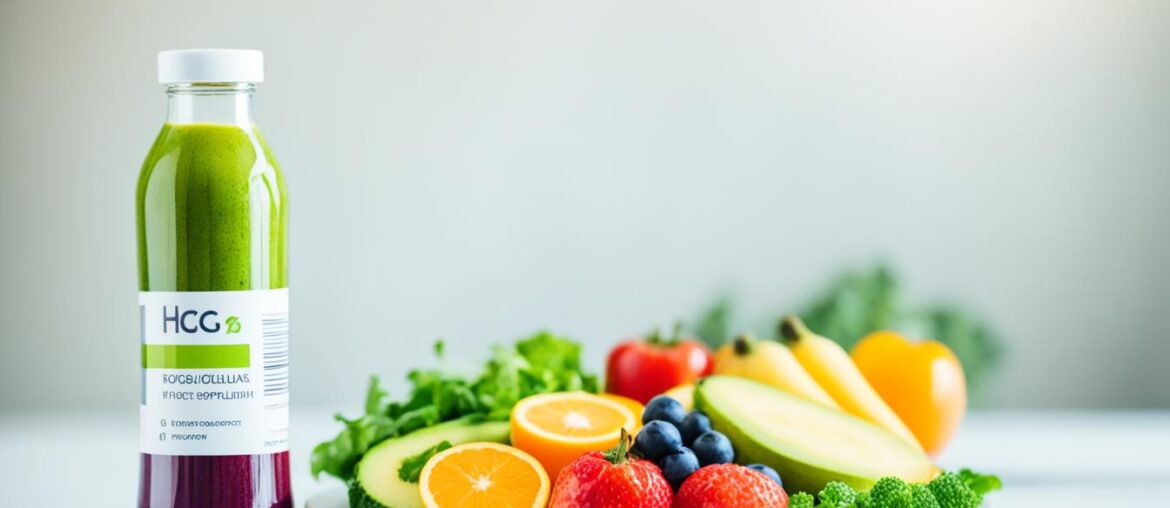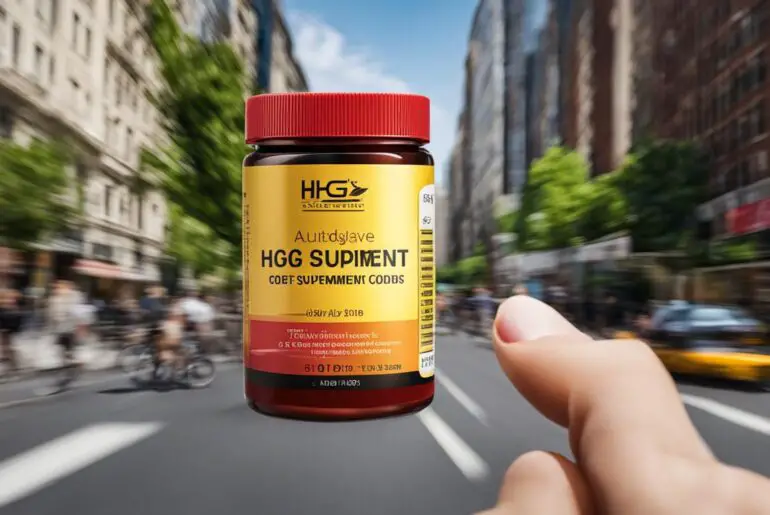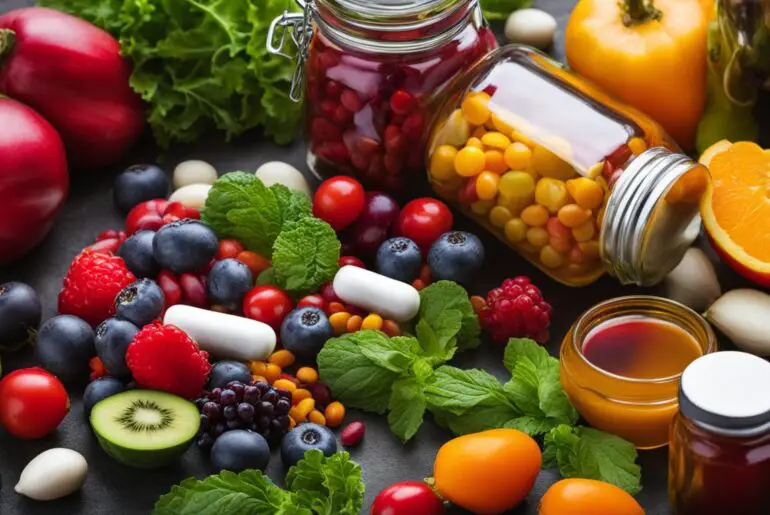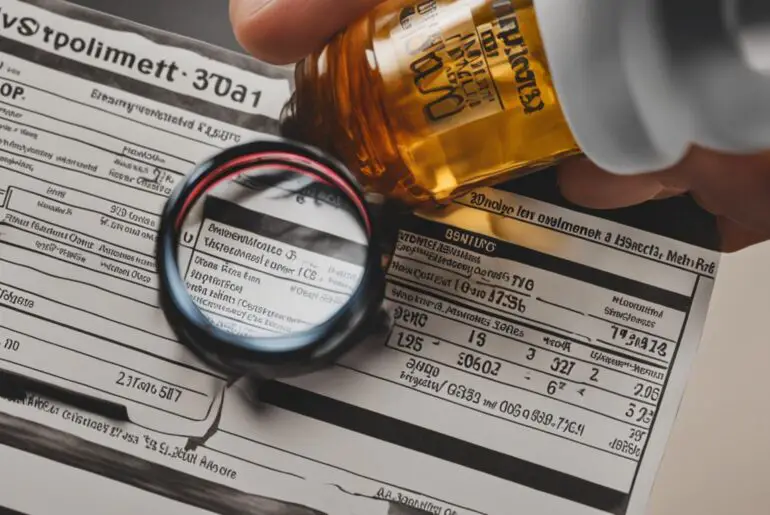Did you know that the HCG Diet is one of the most talked-about weight loss methods in recent years? With promises of rapid results and the allure of hormone supplements, it has gained popularity among those seeking to shed pounds quickly. However, the truth behind this diet may surprise you.
The HCG Diet combines HCG supplements or hormone injections with a low-calorie meal plan. But here’s the catch – the HCG hormone itself has not been proven to have any impact on weight loss. Instead, the diet heavily restricts calorie intake to 500 or 800 calories per day and specifies specific food choices.
In this comprehensive guide, we will delve into the intricacies of the HCG Diet, separating fact from fiction. From understanding the different phases of the diet to exploring the approved foods and avoiding forbidden ones, we will provide you with all the essential information you need to make an informed decision about the HCG Diet.
So, if you’ve been curious about the HCG Diet and its potential benefits for weight loss, continue reading to uncover the truth behind this controversial method.
Key Takeaways:
- The HCG hormone has not been proven to have any effect on weight loss.
- The HCG Diet restricts calorie intake to 500 or 800 calories per day.
- Specific food choices, including lean proteins and select vegetables and fruits, are required on the HCG Diet.
- The HCG Diet raises safety concerns and controversies.
- There are alternative, safer, and more sustainable approaches to weight loss.
Understanding the HCG Diet Protocol
The HCG Diet protocol is designed to promote weight loss through a combination of calorie restriction and specific food choices. It consists of three distinct phases: the loading phase, the weight loss phase, and the maintenance phase. Let’s take a closer look at each phase and what it entails.
1. Loading Phase
The loading phase is the initial stage of the HCG Diet protocol. During this phase, individuals consume high-fat, high-calorie foods for two days while also taking HCG supplements or injections. The purpose of this phase is to “load” the body with fat stores that will be utilized for energy during the subsequent weight loss phase.
This phase allows individuals to indulge in their favorite high-calorie foods, preparing the body for the upcoming calorie restriction. However, it is important to note that the efficacy of this loading phase and its impact on weight loss are still uncertain.
2. Weight Loss Phase
The weight loss phase is the most challenging part of the HCG Diet protocol. It involves a severe calorie restriction of 500 or 800 calories per day, depending on the specific program. This phase typically lasts for several weeks and requires strict adherence to the prescribed calorie intake.
During the weight loss phase, specific food choices are crucial. The diet primarily consists of lean proteins, select vegetables and fruits, while oils, sugars, and starches are strictly prohibited. This combination aims to maximize weight loss and promote healthy eating habits.
3. Maintenance Phase
The maintenance phase is the final stage of the HCG Diet protocol. After completing the weight loss phase, individuals gradually increase their calorie intake while still avoiding sugars and starches. This phase aims to stabilize the weight loss achieved during the previous phases and establish a sustainable eating pattern for long-term weight management.
It is important to note that the HCG hormone itself has not been proven to have any impact on weight loss. The efficacy of the protocol is primarily attributed to the severe calorie restriction and specific food choices.
| Phase | Description |
|——————|————————————————————————————————————————————————————–|
| Loading Phase | * Individuals consume high-fat, high-calorie foods for two days while taking HCG supplements or injections. |
| | * The purpose is to “load” the body with fat stores to be used for energy during the weight loss phase. |
| Weight Loss Phase| * Severe calorie restriction of 500 or 800 calories per day. |
| | * Specific food choices: lean proteins, certain vegetables and fruits, while avoiding oils, sugars, and starches. |
| Maintenance Phase| * Gradual increase in calorie intake while avoiding sugars and starches. |
| | * Aimed at stabilizing weight loss achieved and establishing a sustainable eating pattern for long-term weight management. |
Understanding the HCG Diet protocol and its various phases is key to effectively following the program. The loading phase prepares the body for calorie restriction, the weight loss phase promotes rapid weight loss with specific food choices, and the maintenance phase helps stabilize weight and establish healthy eating habits. However, it’s important to note that the efficacy of the HCG hormone itself has not been proven in the context of weight loss.
The Importance of the Loading Phase
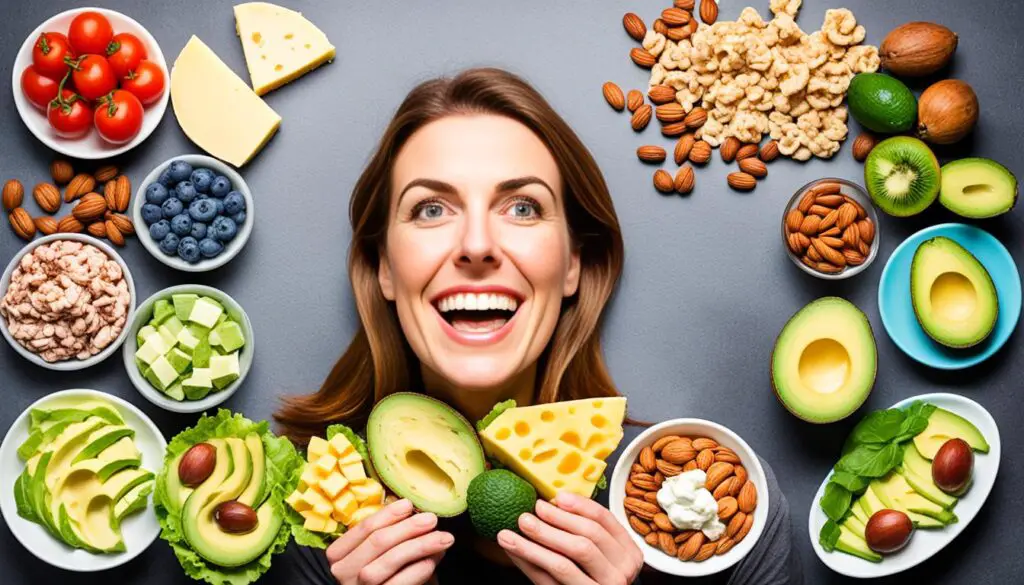
The loading phase of the HCG Diet plays a crucial role in preparing the body for the subsequent weight loss phase. During this phase, individuals are advised to consume high-fat, high-calorie foods for two days while taking HCG supplements or injections. The primary objective of the loading phase is to “load” the body with fat stores that will be utilized as a source of energy during the calorie-restricted weight loss phase.
By intentionally increasing calorie intake during the loading phase, the body’s fat stores are replenished, ensuring a sufficient energy supply during the subsequent period of reduced calorie intake. This loading phase effectively kickstarts the body’s fat-burning mechanisms, allowing for more efficient utilization of stored fat for energy expenditure.
However, it’s important to note that the efficacy of the loading phase and its direct impact on weight loss are still subjects of debate and scientific inquiry. While many proponents of the HCG Diet argue that this phase aids in jumpstarting weight loss and prevents hunger during the subsequent calorie restriction, the available evidence is limited and inconclusive.
The HCG Diet loading phase is typically accompanied by the administration of HCG supplements or injections. The HCG hormone is purported to facilitate weight loss by suppressing hunger and promoting fat mobilization. However, it should be noted that the efficacy of HCG for weight loss remains unproven, with no definitive scientific evidence supporting its effectiveness.
It is important for individuals considering the HCG Diet to consult with healthcare professionals or registered dietitians before embarking on this protocol. They can provide personalized guidance and help determine the most appropriate dietary approach based on individual needs and goals.
Quote:
“The loading phase of the HCG Diet aims to prepare the body for the upcoming weight loss phase by replenishing its fat stores. While its efficacy is still uncertain, it serves as a critical component of the HCG Diet protocol.” – Dr. Jane Collins
The Weight Loss Phase and Calorie Restriction
The weight loss phase of the HCG Diet is a critical component of the program. During this phase, individuals follow a strict calorie restriction of either 500 or 800 calories per day. The purpose of this severe restriction is to promote rapid weight loss. However, it’s important to note that the HCG hormone itself has not been proven to contribute to weight loss.
To adhere to the calorie restriction, the HCG Diet requires specific food choices. These choices include lean proteins, select vegetables and fruits, and the avoidance of sugars, starches, and oils. These guidelines ensure that individuals consume a limited number of calories while still obtaining essential nutrients.
Dieting on such a low-calorie intake can be challenging, as it requires careful meal planning and portion control. It’s crucial to create a balanced and nutritious meal plan that includes an adequate amount of protein, vitamins, and minerals.
The effectiveness of the weight loss phase primarily depends on the calorie restriction, rather than the HCG hormone. The severe calorie restriction forces the body to burn stored fat for energy, leading to weight loss.
| Food Group | Examples |
|---|---|
| Lean Proteins | Chicken breast, turkey, lean beef, white fish |
| Select Vegetables | Spinach, lettuce, cucumbers, broccoli, asparagus |
| Select Fruits | Apples, oranges, strawberries, blueberries |
| Avoid | Sugars, starches, oils, fatty meats |
The weight loss phase of the HCG Diet is undoubtedly challenging, both physically and mentally. It’s essential to consult a healthcare professional before embarking on this program to ensure it is appropriate for your individual circumstances. Additionally, it’s crucial to listen to your body and seek support during this phase to maintain motivation and overcome any obstacles that may arise.
Approved Foods on the HCG Diet
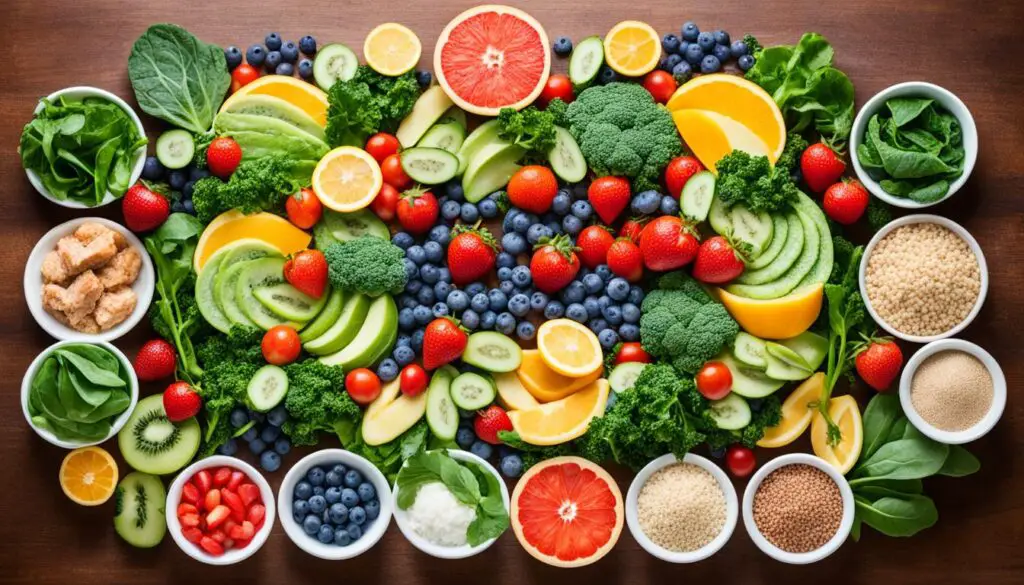
When following the HCG Diet during the weight loss phase, it’s essential to make mindful choices about the foods you consume. The approved foods on the HCG Diet are specifically selected to support your weight loss goals while providing necessary nutrients for optimal health.
The HCG Diet allows for a variety of lean proteins, which are essential for maintaining muscle mass during calorie restriction. Good sources of lean protein include chicken, beef, and fish. These protein-rich foods not only help you feel satisfied but also provide the building blocks for muscle repair and growth.
In addition to lean proteins, select vegetables and fruits are included in the HCG Diet food choices. Vegetables such as spinach and cabbage are low in calories and packed with vitamins and minerals. Fruits like apples and oranges provide natural sweetness and hydration.
The HCG Diet guidelines strictly prohibit oils, sugars, and starches. Oils can add unnecessary calories and hinder weight loss progress. Sugars and starches can cause blood sugar spikes and inhibit fat burning. By avoiding these items, you can ensure optimal results on the HCG Diet.
The HCG Diet Approved Foods at a Glance:
| Lean Proteins | Select Vegetables | Select Fruits | Avoid |
|---|---|---|---|
| Chicken | Spinach | Apples | Oils |
| Beef | Cabbage | Oranges | Sugars |
| Fish | Lettuce | Starches |
Remember, portion control and limited calorie intake play key roles in achieving success on the HCG Diet. Consult with a healthcare professional or registered dietitian to ensure that you are following the diet safely and effectively.
Avoiding Forbidden Foods on the HCG Diet
The HCG Diet comes with strict restrictions on the consumption of certain foods to promote weight loss. Adhering to these guidelines is crucial for maximizing results and achieving your desired outcomes. Here, I will outline the forbidden foods on the HCG Diet and why they should be avoided.
Forbidden Foods
When following the HCG Diet, you must avoid the following:
- Dairy products: This includes milk, cheese, yogurt, and butter.
- Grains: Wheat, rice, oats, and products made with flour are not permitted.
- High-carb foods: Potatoes, corn, and other starchy vegetables are off-limits.
- Fats and oils: This includes any cooking oil, butter, or fatty dressings.
The HCG Diet prohibits these foods to maintain a severe calorie restriction and optimize weight loss. By eliminating these high-calorie and high-carb options, the body is forced to burn stored fat for energy instead.
Benefits of Avoiding Forbidden Foods
By staying disciplined and avoiding forbidden foods on the HCG Diet, you can experience numerous benefits, including:
- Accelerated weight loss: Removing high-calorie and high-carb foods from your diet promotes faster fat burning and facilitates rapid weight loss.
- Steady blood sugar levels: The HCG Diet’s food restrictions help stabilize blood sugar levels, reducing cravings and promoting balanced energy throughout the day.
- Improved overall health: By eliminating unhealthy fats, refined carbohydrates, and processed foods, you enhance your overall health and well-being.
It’s essential to maintain discipline and adhere to the HCG Diet’s guidelines to achieve optimal results.
Following the HCG Diet’s restrictions and avoiding forbidden foods is a key aspect of the weight loss protocol. By making mindful food choices and embracing the discipline required, you empower yourself to achieve your weight loss goals effectively.
Safety Concerns and Controversies of the HCG Diet
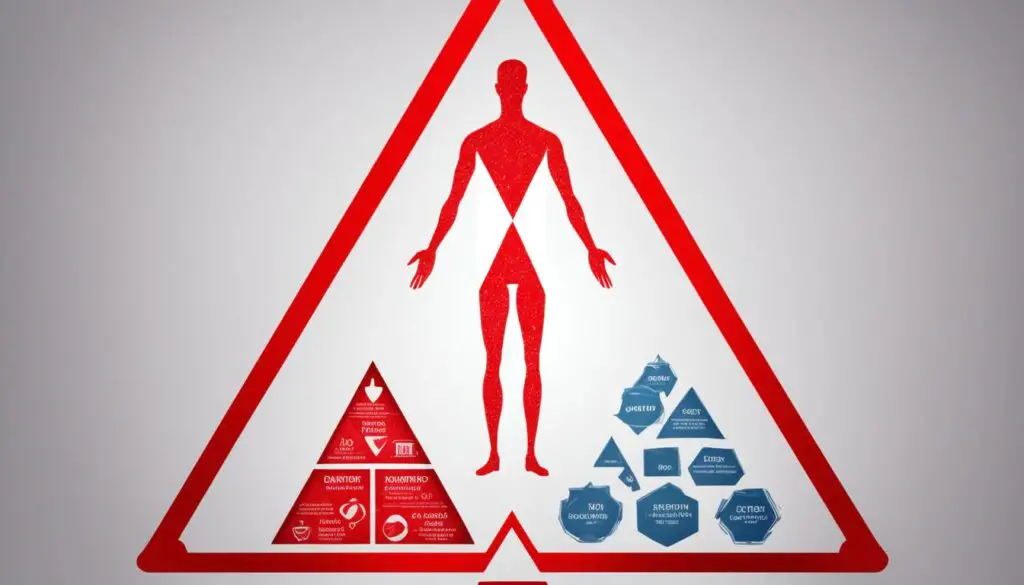
The HCG Diet has been the subject of safety concerns and controversies due to several reasons. One of the primary concerns is the legality and FDA approval of HCG products for weight loss purposes. The HCG hormone is only approved by the FDA for the treatment of female infertility and is not recognized as safe or effective for weight loss. Therefore, using HCG supplements or injections for weight loss is not supported by scientific evidence or regulatory agencies.
Another aspect that raises concerns is the availability of over-the-counter HCG products. The sale of HCG products for weight loss without a prescription is illegal, as it goes against regulations set by the FDA. The use of unauthorized HCG products can lead to potential health risks, as these products may not meet quality standards or have proper dosage control.
Furthermore, the effectiveness of HCG for weight loss is a subject of controversy. Despite anecdotal claims supporting its efficacy, there is no substantial evidence to support the use of HCG for weight loss. The weight loss observed during the HCG Diet can be attributed to the severe calorie restriction rather than the hormone itself.
The restriction of calorie intake to 500 or 800 calories per day during the HCG Diet raises additional safety concerns. Severely limiting calorie intake can have adverse effects on the body, resulting in nutritional deficiencies, muscle loss, fatigue, and metabolic imbalances.
Overall, the safety concerns, lack of scientific evidence, and legal restrictions on HCG products question the viability and sustainability of the HCG Diet. It is essential to prioritize one’s health and consider alternative approaches that are based on long-term success and supported by credible scientific research.
Key Points:
- The HCG Diet is not FDA-approved for weight loss.
- Over-the-counter HCG products are illegal.
- No substantial evidence supports the efficacy of HCG for weight loss.
- Severe calorie restriction can pose health risks.
Considerations and Alternatives for Weight Loss

While the HCG Diet may lead to rapid weight loss, it is not recommended by health experts due to its potential risks and lack of scientific evidence. The diet’s association with severe calorie restriction and the use of a hormone supplement has raised concerns about its safety and effectiveness.
To achieve healthy weight loss, there are numerous alternatives that offer more sustainable results and prioritize overall well-being. By making lifestyle changes, focusing on balanced nutrition, engaging in regular exercise, and seeking guidance from healthcare providers or registered dietitians, individuals can achieve their weight loss goals in a safe and effective manner.
It’s important to remember that sustainable weight loss is not just about shedding pounds quickly but also about developing lifelong habits that support a healthy lifestyle. Here are some key factors to consider when exploring alternatives:
- Healthcare Provider Guidance: Consulting with a healthcare provider or registered dietitian can provide personalized recommendations and support throughout the weight loss journey.
- Lifestyle Changes: Making sustainable lifestyle changes, such as increasing physical activity, getting enough sleep, managing stress, and establishing a regular meal schedule, can contribute to long-term weight loss success.
- Balanced Nutrition: Following a balanced and nutritious diet that includes a variety of whole foods, such as fruits, vegetables, lean proteins, whole grains, and healthy fats, can support weight loss without the risks associated with extreme calorie restriction.
- Regular Exercise: Incorporating regular exercise into a weight loss plan helps burn calories, build muscle, and improve overall fitness. Engaging in activities that are enjoyable and sustainable, such as walking, cycling, swimming, or group fitness classes, can lead to successful long-term weight management.
- Behavioral Changes: Addressing emotional eating patterns, developing healthy coping mechanisms, and practicing mindful eating can contribute to sustainable weight loss and healthy habits.
“Sustainable weight loss is not a quick fix but a journey towards a healthier lifestyle.”
By adopting a holistic approach to weight loss, individuals can achieve their goals while minimizing the risks and potential drawbacks associated with fad diets like the HCG Diet. Prioritizing overall health, sustainability, and long-term success is key when embarking on a weight loss journey.
Remember, weight loss is a personal journey, and what works for one person may not work for another. It is essential to find an approach that aligns with individual needs, preferences, and goals to achieve sustainable weight loss and maintain a healthy lifestyle.
HCG Diet vs. Healthy Weight Loss Alternatives
| HCG Diet | Healthy Weight Loss Alternatives |
|---|---|
| Severe calorie restriction | Balanced and nutritious diet |
| Use of HCG hormone supplements | Personalized guidance from healthcare professionals |
| Questionable scientific evidence | Evidence-based strategies |
| Potential risks and side effects | Safe and sustainable practices |
| Restrictive food choices | Flexible and varied meal options |
Conclusion
Knowing the final thoughts on the HCG Diet and summarizing its key aspects is crucial for making informed decisions about weight loss strategies. The HCG Diet is a contentious protocol that combines strict calorie restriction with HCG supplements or hormone injections. While some individuals may experience rapid weight loss, it is important to note that the effectiveness of the HCG hormone itself in promoting weight loss has not been scientifically proven.
The HCG Diet requires strict adherence to calorie intake and specific food choices, including lean proteins, select vegetables, and fruits. However, it is essential to consider the safety concerns associated with this diet. The lack of scientific evidence and legal restrictions on HCG products raise doubts about its viability and sustainability.
Therefore, when considering weight loss options, it is advisable to explore alternative approaches that prioritize overall health and long-term success. Lifestyle changes, balanced nutrition, regular exercise, and seeking guidance from healthcare providers or registered dietitians are viable alternatives to the HCG Diet. These approaches offer safer and more sustainable ways to achieve weight loss goals while ensuring overall well-being.
In conclusion, the HCG Diet is a controversial weight loss protocol that may yield rapid results for some individuals. However, the effectiveness of the HCG hormone itself is unconfirmed, and safety concerns, lack of scientific evidence, and legal restrictions on HCG products raise questions about its long-term viability and effectiveness. When pursuing weight loss, it is important to consider alternative approaches that prioritize overall health and sustainability.
FAQ
What is the HCG Diet?
The HCG Diet is a weight loss protocol that combines HCG supplements or hormone injections with a low-calorie diet.
What are the phases of the HCG Diet?
The HCG Diet consists of three phases: the loading phase, the weight loss phase, and the maintenance phase.
Does the HCG hormone help with weight loss?
The HCG hormone has not been proven to have any effect on weight loss.
How many calories are allowed on the HCG Diet?
The HCG Diet restricts calorie intake to 500 or 800 calories per day.
What foods are allowed on the HCG Diet?
Approved foods on the HCG Diet include lean proteins, select vegetables, and fruits.
What foods should be avoided on the HCG Diet?
Forbidden foods on the HCG Diet include dairy products, grains, high-carb foods, fats, and oils.
Is the HCG Diet safe?
The HCG Diet has raised safety concerns and controversies. The HCG hormone is only approved by the FDA for the treatment of female infertility.
Are there alternatives to the HCG Diet for weight loss?
There are many alternatives for weight loss that are safer and more sustainable, including lifestyle changes, balanced nutrition, regular exercise, and seeking guidance from healthcare providers or registered dietitians.

